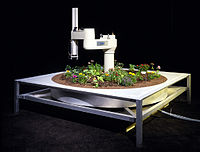 | |
| Type of site | Telerobotics |
|---|---|
| Available in | English |
| Created by | Ken Goldberg and Joseph Santarromana |
| Commercial | No |
| Registration | Optional |
| Launched | June 1995; 29 years ago (1995-06) |
| Current status | Offline |
The TeleGarden was a telerobotic community garden for the Internet. Starting in the mid-1990s, it allowed users to view, plant and take care of a small garden, using an Adept-1 industrial robotic arm controlled online.
History
The project began at the University of Southern California with project directors Ken Goldberg of University of Southern California, and Joseph Santarromana, a University of California, Irvine artist at the time known for his video installations. They envisioned it as an art installation challenging the notion of the Internet and "consider the 'post-nomadic' community, where survival favors those who work together."
Project members included George A. Bekey, Steven Gentner, Rosemary Morris, Carl Sutter, Jeff Wiegley, and Erich Berger. The Telegarden went online in June 1995. During its first year, it attracted over 9000 members. In September 1996, the Telegarden was moved to the Ars Electronica Center in Austria where it was originally planned to be on display for one year, though it ended up remaining active until August 2004 (2004-08).
The Telegarden was a fusion between old technology (agriculture) and new technology (the Internet). The notion of a physical garden that is operated by users online was appealing to Goldberg because "it was the most absurd".
This new media art raised questions of legitimacy. How are users to know that the garden actually exists, or that any of their motions matter? Goldberg stressed that, "media technology generally facilities the suspension of disbelief."
In its nine years, the installation had 10,000 members, and 100,000 people visited the physical exhibit. Users interactivity created a miniature social network. People became protective of plants, even territorial.
References
- "Tele-Garden Info". Ars Electronica Center. Archived from the original on 1997-04-11. Retrieved 2011-04-15.
- ^ "The Telegarden". Archived from the original on 2005-04-05. Retrieved 2011-04-15.
- "Zingmagazine 2". Archived from the original on 2020-07-16. Retrieved 2011-04-15.
- Ken Goldberg - Mark Tribe - Brown University Wiki
- ^ "The Telegarden Website". Archived from the original on 2019-03-02. Retrieved 2008-09-11.
- "The Telegarden Website". goldberg.berkeley.edu. Retrieved 2018-05-07.
- Telegarden Description from YouTube
- P. H. Kahn; B. Friedman; I. S. Alexander; N. G. Freier; S. L. Collett (August 13, 2005). "The distant gardener: What conversations in the telegarden reveal about human-telerobotic interaction". ROMAN 2005. IEEE International Workshop on Robot and Human Interactive Communication, 2005. IEEE. pp. 13–18. CiteSeerX 10.1.1.515.6445. doi:10.1109/ROMAN.2005.1513749. ISBN 978-0-7803-9274-8. S2CID 11326814.
Further reading
- Ken Goldberg, ed. (March 2000). The Robot in the Garden: Telerobotics and Telepistemology in the Age of the Internet. A Leonardo Book. MIT Press. ISBN 978-0-262-07203-8. Retrieved 2011-04-15.
External links
- Telegarden homepage Archived 2019-03-02 at the Wayback Machine from Ken Goldberg
- Ken Goldberg's UC Berkeley homepage
- Introduction to Telegarden by Ars Electronic (Linz, Austria)
- Photo Collage and Description from "Database of Virtual Art" (virtualart.at)
- "Telematic Connections," Curated Piece on the Development of Telepresence from the Walker Art Center
- "A Performance Space without Geographical Boundaries" (1977) from ecafe.com
- Muntadas's "File Room" (1994)